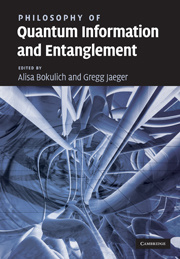Description
Philosophy of Quantum Information and Entanglement
Coordinators: Bokulich Alisa, Jaeger Gregg
This book addresses the most important developments and debates in this exciting area of research for historians, philosophers of science and physicists.
Language: English
Subject for Philosophy of Quantum Information and Entanglement:
Publication date: 06-2010
308 p. · 17.8x25.5 cm · Hardback
308 p. · 17.8x25.5 cm · Hardback
Description
/li>Contents
/li>Biography
/li>
Recent work in quantum information science has produced a revolution in our understanding of quantum entanglement. Scientists now view entanglement as a physical resource with many important applications. These range from quantum computers, which would be able to compute exponentially faster than classical computers, to quantum cryptographic techniques, which could provide unbreakable codes for the transfer of secret information over public channels. These important advances in the study of quantum entanglement and information touch on deep foundational issues in both physics and philosophy. This interdisciplinary volume brings together fourteen of the world's leading physicists and philosophers of physics to address the most important developments and debates in this exciting area of research. It offers a broad spectrum of approaches to resolving deep foundational challenges - philosophical, mathematical, and physical - raised by quantum information, quantum processing, and entanglement. This book is ideal for historians, philosophers of science and physicists.
Preface; Introduction; Part I. Quantum Entanglement and Nonlocality: 1. Nonlocality beyond quantum mechanics Sandu Popescu; 2. Entanglement and subsystems, entanglement beyond subsystems, and all that Lorenza Viola and Howard Barnum; 3. Formalism locality in quantum theory and quantum gravity Lucien Hardy; Part II. Quantum Probability: 4. Bell's inequality from the contextual probabilistic viewpoint Andrei Khrennikov; 5. Probabilistic theories: what is special about quantum mechanics? Giacomo Mauro D'Ariano; 6. What probabilities tell about quantum systems, with application to entropy and entanglement John Myers and Hadi Madjid; 7. Bayesian updating and information gain in quantum measurements Leah Henderson; Part III. Quantum Information: 8. Schumacher information and the philosophy of physics Arnold Duwell; 9. From physics to information theory and back Wayne Myrvold; 10. Information, immaterialism, and instrumentalism: old and new in quantum information Chris Timpson; Part IV. Quantum Communication and Computing: 11. Quantum computation: where does the speed-up come from? Jeff Bub; 12. Quantum mechanics, quantum computing and quantum cryptography Tai Wu.
Alisa Bokulich is a Professor in the Philosophy Department at Boston University, and an active member of Boston University's Center for Philosophy and History of Science. Her research focuses on the history and philosophy of physics, as well as broader issues in the philosophy of science.
Gregg Jaeger is a Professor at Boston University, where he teaches courses in the Mathematics, Natural Science, and Philosophy departments. His recent research focuses on decoherence, entanglement, quantum computing, and quantum cryptography, and in 2008 he was awarded a Kavli fellowship.
Gregg Jaeger is a Professor at Boston University, where he teaches courses in the Mathematics, Natural Science, and Philosophy departments. His recent research focuses on decoherence, entanglement, quantum computing, and quantum cryptography, and in 2008 he was awarded a Kavli fellowship.
© 2024 LAVOISIER S.A.S.
These books may interest you

What is Quantum Information? 91.52 €



